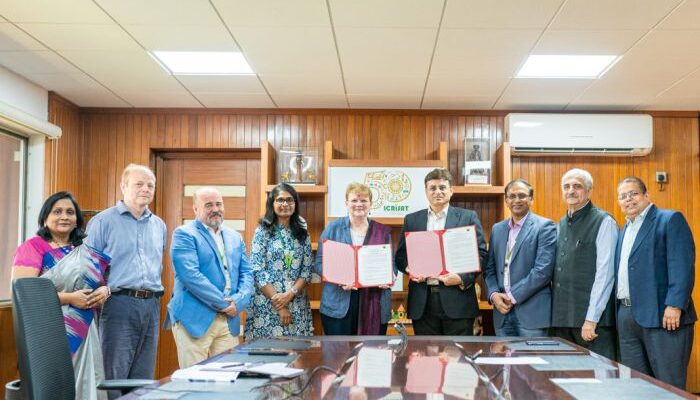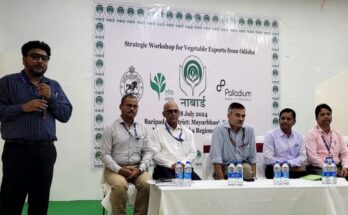Hyderabad, India – International Crops Research Institute for the Semi-Arid Tropics (ICRISAT) and the Indian Oilseeds & Produce Export Promotion Council (IOPEPC) signed a memorandum of understanding (MoU) on March 8, 2023, to enhance India’s oilseed production, improve quality and boost exports.
The MoU was signed by ICRISAT’s Director General, Dr Jacqueline Hughes, and IOPEPC’s Chairman, Nilesh Vira, with the aim of strengthening long-term cooperation to increase the quantum and quality of oilseeds grown in India.
In order to boost oilseed production, the collaboration will focus on expanding cultivated areas, deploying scientific technologies, and collaborating at all levels, including providing farmers with better quality certified seeds and strengthening the supply chain of oilseeds.
In addition, the partnership will promote food safety principles, recommend policies and programmes to the Government of India and support the growth of the Indian oilseed sector.
During the discussions, Vira stressed the importance of developing climate-resilient oilseed crops, given the unpredictable weather patterns affecting India’s agriculture. He cited the challenge faced by farmers in growing aflatoxin-free groundnuts, a crop that is increasingly in demand in the export market.
You may also like to read: Godrej Agrovet signs MoU with AP Govt to invest Rs 100 Cr in oil palm business in the state
“Farmers want oilseed crops that can withstand climate vagaries. Changing monsoon patterns are affecting oilseed crops that usually take 110-120 days to mature. Farmers do not want to grow oilseeds due to unpredictable weather and we need to find solutions,” said Vira.
Emphasising the need to increase India’s oilseed production, Kishore Tanna, Director-Groundnut Panel Convenor, IOPEPC said that India is importing 15 million tonnes of edible oil and that’s because farmers do not want to grow oilseeds, especially groundnuts.
Tanna also drew attention to the fact that groundnut exports to the European Union had dropped to around 6000-7500 tonnes due to stringent import rules on aflatoxin that call for levels of not more than 2 – 4 PPB for various grades of groundnut.
ICRISAT’s Director General, Dr Hughes, highlighted the need to eliminate intermediaries in the export value chain, thereby increasing the profits for smallholder farmers. She also emphasised ICRISAT’s commitment to finding solutions to eliminate aflatoxin in groundnuts, which has detrimental effects on all consumers.
You may also like to read: Flipkart India launches ‘Samarth Krishi’ programme to create market linkage for FPOs
“Aflatoxin elimination is a doable challenge for ICRISAT, and partnership with IOPEPC will help ICRISAT focus on key areas of intervention applicable for the peanut sector in India,” said Dr Hughes.
The visiting team shared several avenues to shorten the export value chain and establish direct connections between farmers and exporters. One successful example they cited was the short value chain for soybeans in Rajasthan and Gujarat, which has the potential for replication in other crops. They also mentioned the growing popularity of e-markets as another potential avenue for connecting farmers and exporters.
The MoU signing was attended by ICRISAT staff Dr Sean Mayes, Stefan De Greling, and Dr Janila Pasupuleti, and convened by ICRISAT’s Product Placement Lead Dr Ashok Kumar and Ramesh P Kolath, Deputy CEO, IOPEPC.
IOPEPC is recognised by the Ministry of Commerce, Government of India, and serves as the common forum for Indian oilseeds and vegetable oils exporters, foreign buyers, the Indian government, R&D agencies for oilseeds and vegetable oils in India, international agencies, and many other official bodies and authorities globally.




